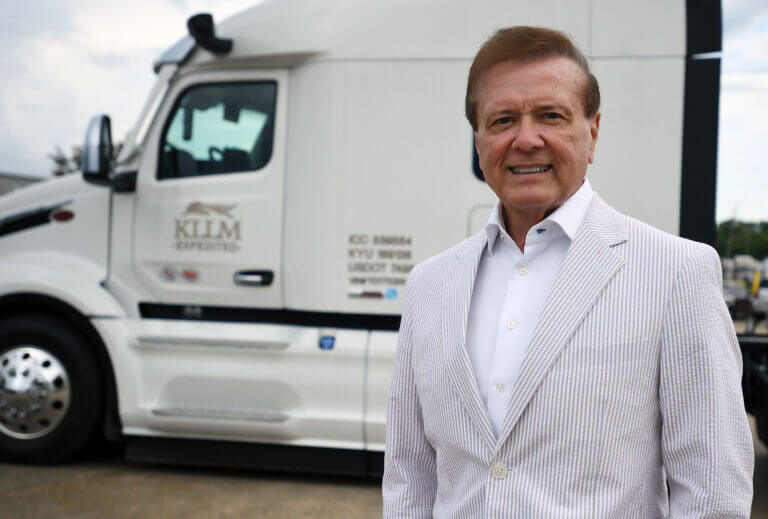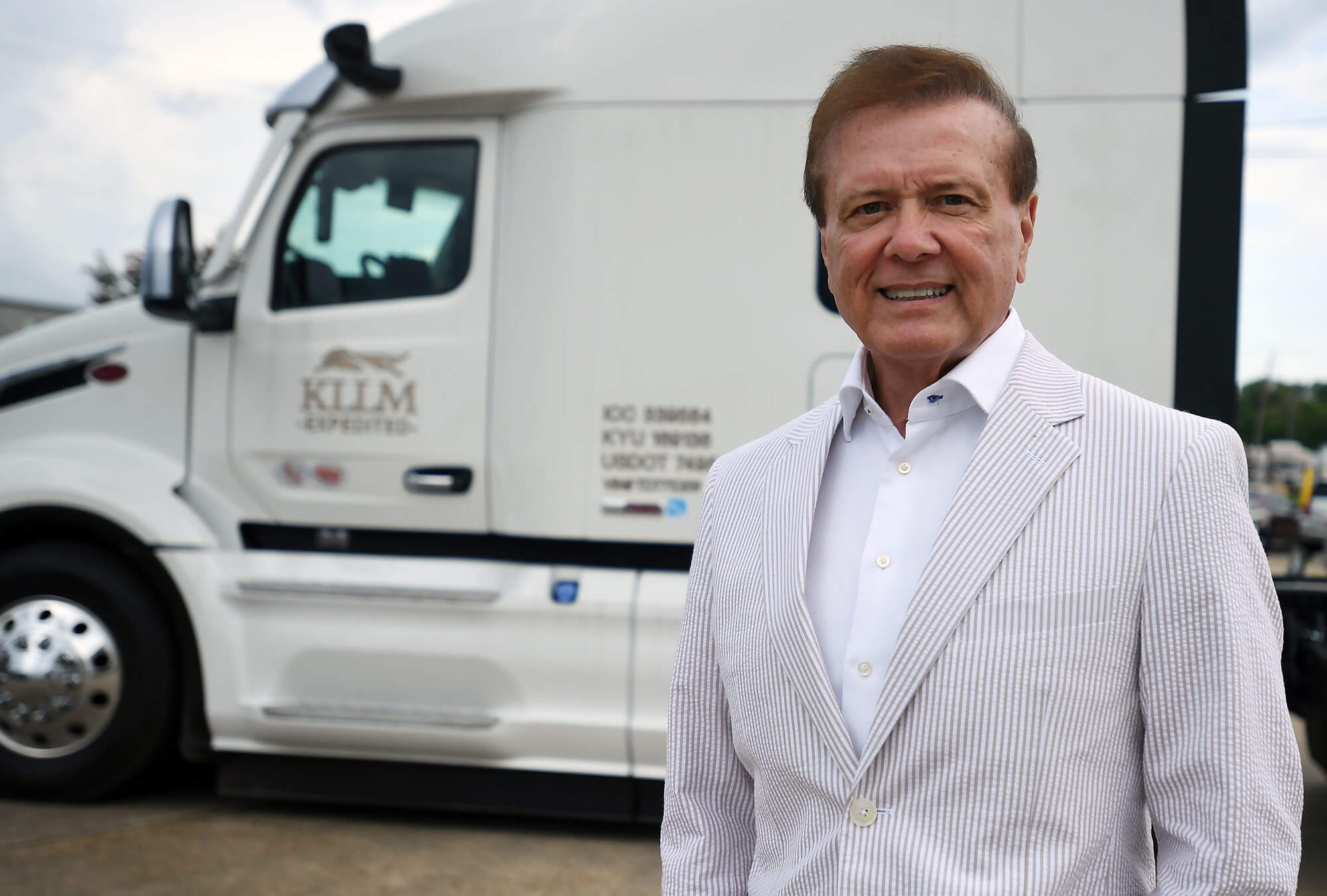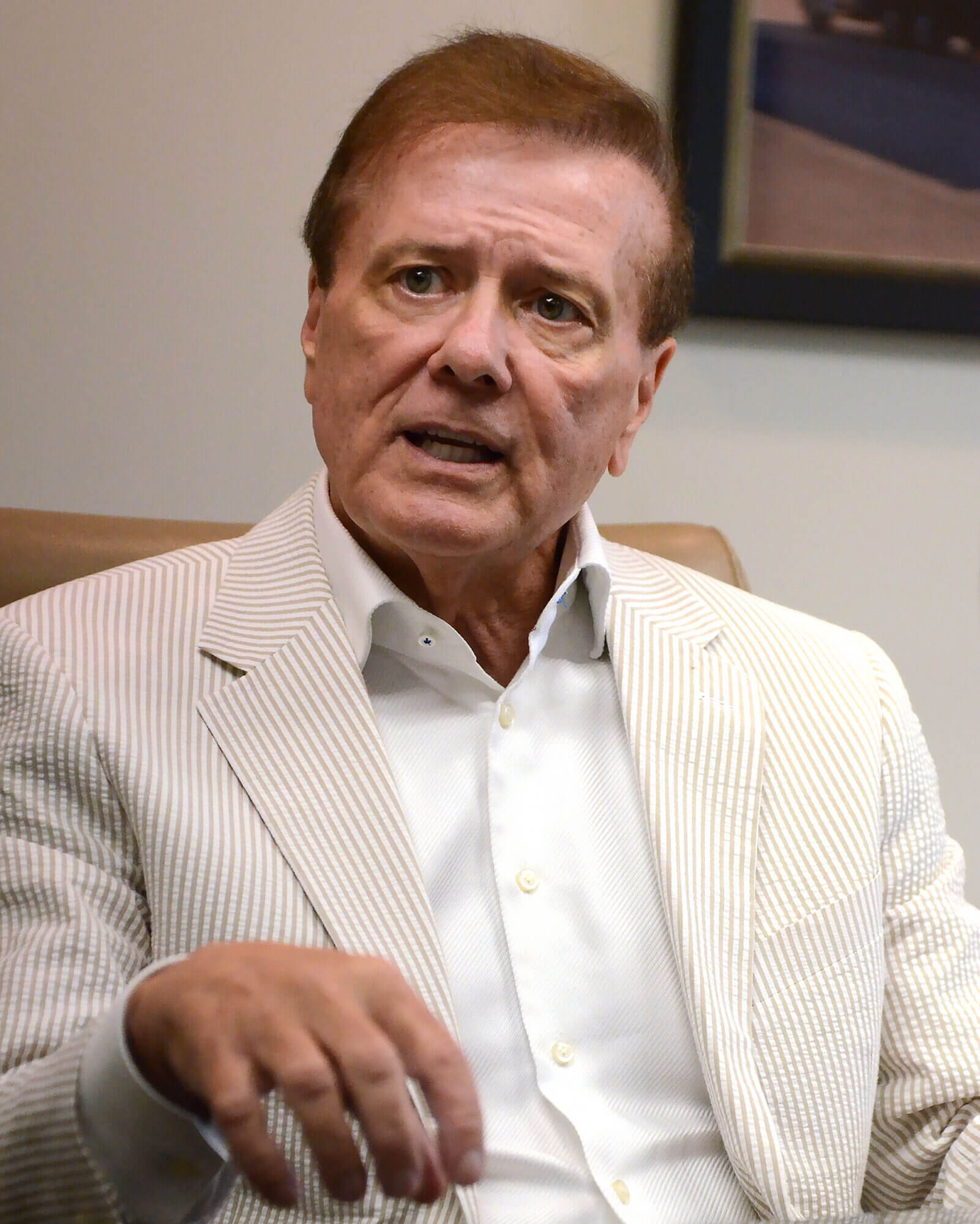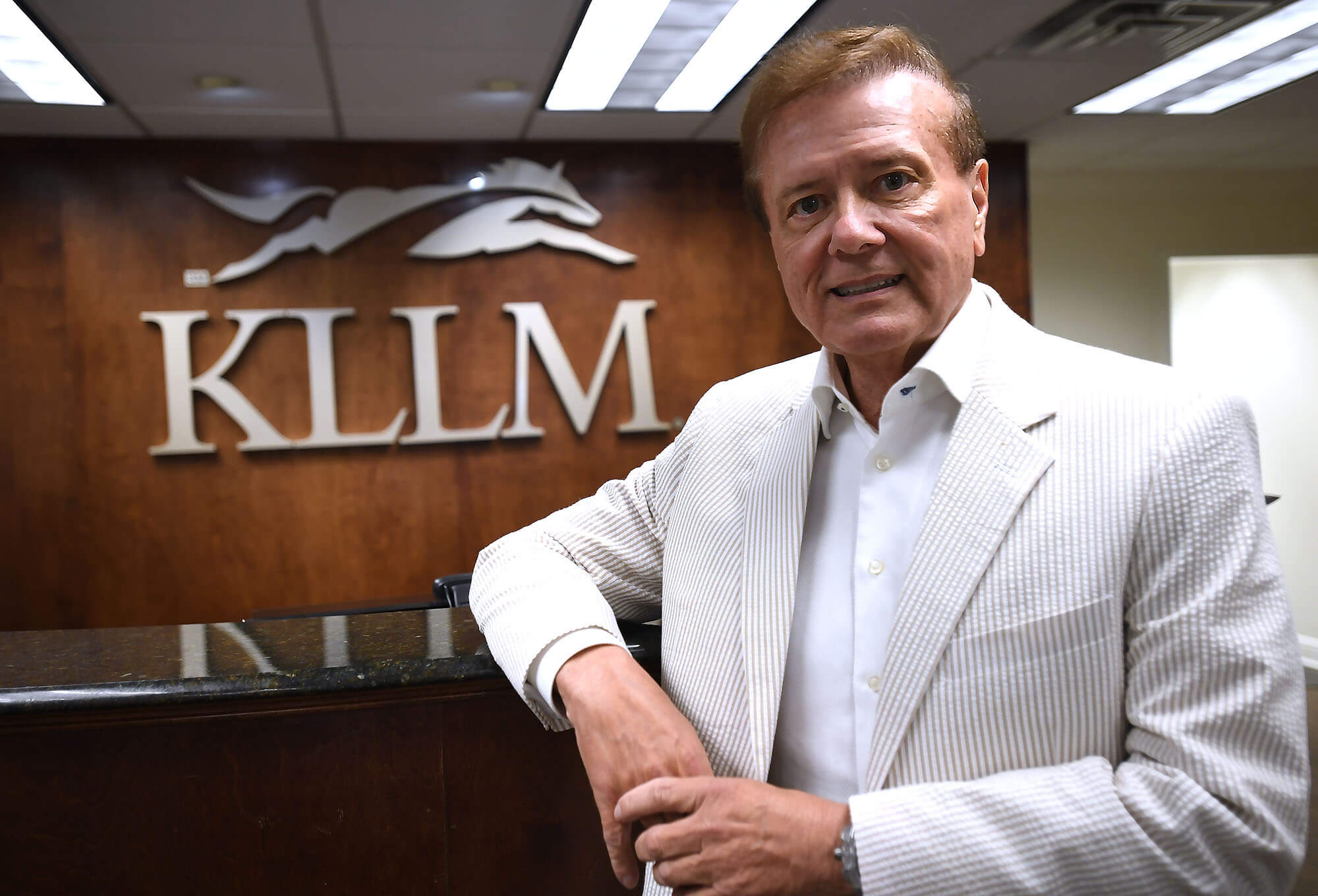

Thomas Duff has used his wealth from a tire empire he and his brother created to become a political power broker and sought-after philanthropist.
Duff, of Hattiesburg, has been involved in state politics, but only peripherally or behind the scenes. Now, the tire baron is considering a political run of his own. His entrance into the 2027 Republican primary for governor could reshape a field of candidates likely to include several statewide officials.
Duff served an eight-year stint on the state Institutions of Higher Learning Board, first appointed by former Gov. Phil Bryant. He has been a major contributor to many Republican campaigns in Mississippi, and earlier this year formed and funded a political action committee to help elect Republicans to city and legislative offices. He and his brother are major supporters of higher education and have donated millions to Mississippi universities.
As he mulls a run for governor, the billionaire businessman sat for a wide-ranging interview with Mississippi Today.
The conversation spanned his business philosophy, support for tariffs, concerns about Mississippi’s “brain drain,” and his investments in the state’s higher education system. It also touched on where he stands on issues such as immigration, Medicaid expansion, “school choice,” and his affinity for President Donald Trump.
The interview was conducted June 17 and has been edited for clarity and length.
Mississippi Today: Tell me about the moment when you knew that what you were building would grow far bigger than the family business your father had left you. When did you have a sense of the scale at which you were really working with?
Thomas Duff: That’s a good question. Nobody’s ever asked me that before. When I got into our business, we were in very bad financial shape. Southern Tire Mart was a little company with about seven employees, losing money every month. My father was an attorney in Columbia. He loved business, but he was not active, he just liked to own them. I was finishing up a master’s degree in business, which I did not finish. So I was going to law school at Ole Miss and decided that I liked business much more than practicing law. So I said, ‘Can I stay on and just try to run this company?’ Because I grew up in high school working on tires, changing tires, retreading tires, being very involved in it. My dad said yes. And so I started, and that’s where we began.
After I got involved in it and liked it, and frankly, started having some success in it, I would say, within about five to eight years after we began, I realized that this thing had potential. It’s really not a job, it’s an opportunity. And truthfully, I’ve never worked a day of my life because I’ve enjoyed being in business that much.
Our business started with Southern Tire Mart. That has enabled us to be in other businesses and given opportunities. KLLM was a customer of Southern Tire Mart for many, many years, and it had undergone several ownership changes. It had gone public, it had gone back private. So we realized there were opportunities, and hopefully that it would be a profitable opportunity. And so we purchased other businesses that way, and that’s how we grew.
MT: Your core businesses require an integrated transportation ecosystem. Supply chain issues have now taken on a growing salience in our politics. Tell me about the evolution of supply chain issues, and your observations of debates surrounding onshoring versus offshoring that have come closer to the center of the political conversation. What has that been like to watch from your perspective?
Duff: We are uniquely affected by the supply situation. Also by the products that come from Asia and China, in particular. United States truck tire manufacturing only supplies about 70% of our needs in this country. So 30% have to come from outside the United States. So how do you deal with that? Where do you buy? What do you buy? Is it the right thing for customers to buy?
It’s given us insights into how these foreign companies operate, and frankly, it’s not pleasing, because you see how so many of them have taken advantage of American laxity. Just being, frankly, lax in the way we operate in our supply management, it’s something that needs to be tightened up. We need more domestic manufacturing. There is the demand. There’s just not the manufacturing capacity. So our goal has been to try to increase that.

MT: With tariffs and trade policy being such a central element of political debate right now, what is your view on the trade-offs between free trade, getting products to market and protecting local industries?
Duff: I think that’s a concern for a lot of people in Mississippi. I think we have watched American manufacturing be a serious problem for the last 25 years — it’s dissipated. We don’t have the trades and the things that we need. We are too dependent.
But outside of supply chains, and we need to work on that, I have watched tariffs in the last few months be a good thing that’s happening. We approve of what President Trump is trying to do, because this mess existed long before he got here. He’s trying to correct it, and if we can correct it, which we will, it’ll take some short-term concerns, short-term hardships, but it’s going to be a long-term gain for our country. And I say that to you as a person who will probably pay more in tariffs, right? It will hit us hard. But is it going to be corrected? Yes, it will be. So, you know, we got into this mess over 20 or 30 years, it’s gonna take a little while to come out of it.
MT: What is your perspective then on short-term economic cost, let’s say, versus a longer-term structural fix in the economy. Mississippi is one of the poorest states in the country. How should people in a state like this who are working class perceive these sorts of trade-offs?
Duff: Obviously, it is a concern. The question is how much of a concern should it be to the average Mississippian? Again, this is a short-term situation. It will have great long-term benefits. And I think what President Trump is trying to do is appropriate, and it will be successful in the end.
For example, when we had a 20% tariff here, the first time with President Trump’s presidency, our car prices went up three or four percent, what we found out was, in China, they’re more interested in employment and keeping those plants going than they are in profitability because they’re Chinese-owned anyway. It’s not like a normal company like I have that tries to show a profit. In China they’re trying to show employment. So when people talk about these tariffs and what they mean in pricing, we have no evidence that it’s going up that much. What we’re seeing is many manufacturers saying we’re reducing the amount of the increase and trying to work with the American consumer, that’s particularly true for the folks in Mississippi.
MT: You’ve said that retaining employees and attracting quality employees is a priority for you in business. As far as the labor market is concerned, how should Mississippians be thinking about immigration policy? How does reducing immigration impact the economy here in Mississippi?
Duff: You know, we value every person. Each is important for what they do and in their employment throughout our businesses, and frankly, throughout this state. Getting rid of people that have convictions, have problems that come from other countries, that should be one of the highest priorities of stopping the illegal immigration at the southern border. That is is very important, because we need that stability in our employment.
We are doing well in finding qualified people to work, and I think that’s one of the reasons that we see a lower labor participation rate in our state, you’ve got to offer people good jobs. But you know what? You’ve got to do more than that. You’ve got to have appropriate child care. You’ve got to have good medical. You’ve got to have the things that attract people to say, ‘Hey, I desire to work.’
We need more Mississippians at work and we need to be more attractive in what we offer people. That’s very important, and that’s one of the greatest responsibilities that my brother and I have. Do we offer those types of opportunities? Employment wise, social wise. I mean, having proper nursery care, having proper health care is just as important as your wage in today’s world.
MT: Sure. And to that end, let’s talk about the social safety net. Of course, private employers play an important role in providing access to health care, but there is a segment of Mississippians that may need to rely on the public benefits. Do you think Mississippi should expand Medicaid?
Duff: You know, I think there are so many rules about Medicaid expansion, it’s hard to always say I’m in favor of it or not in favor of it. Do people need better medical care in the state of Mississippi? Yes, sir. Do more people need to be included in that? Yes, the health of our state is so important. So we have got to offer those things through businesses, through state assistance that helps all Mississippians have better health care. That’s got to be one of the top responsibilities that we all have. How it’s done in today’s changing political environment? I don’t know what to say, but I do know that it’s got to be of the highest importance, and we need to take care of all Mississippians.
MT: So what you’re saying is you’re neither wedded to expansion nor entirely against it? Are you saying you’re open to all options?
Duff: I want to know the facts and the facts that are best for the people in Mississippi, and those facts have changed with a new president. So it’s hard to really say until we understand the changing political environment.
MT: I want to ask you about your conception of “welfare” as well. It’s been a politically charged term for a long time, people have different ideas about what programs should be considered welfare. How do you think about welfare and how it relates to the safety net here?
Duff: Well, we need a safety net that’s appropriate and takes care of needs, especially for people who have those needs. We also need a system where people participate, where they’re paid adequately, where they can take care of their families and take care of themselves.
So my definition of those things would be, if you can work, you need to work. And it’s not just working, it’s working at a higher level. Some people have jobs that they could easily go to someone else, and they could do higher-level jobs. Can you have a better education? Can you have workforce training? How can you maximize your potential in your job?
MT: You mentioned education and training. You and your brother have invested about $50 million in Mississippi universities. So higher education has been a focus of yours, and the issue of “brain drain” has been one of your central concerns. How would you propose that either yourself or others fix this brain drain issue in Mississippi?
Duff: The first thing we’ve got to do, and it’s not a simple answer, we need to have K-12 education that is excellent. And by having excellent education, you prepare people either for vocational jobs or for going into a four-year college route. But you’ve got to have the basics done.
We have made rapid progress in that. The Mississippi Miracle is real, and we see that. But the real question is, as everybody else is getting better, can we keep our foot on the accelerator and continue to expand K-12? Now we go to vocational, which is so important. We were talking in a meeting this morning about the vocational needs and of some of our businesses, it’ll amaze you what we pay vocational employees, and I’m glad to see they do really well. They have great incomes, a good living. And I like seeing those things. And then we decide to go with the four-year college route, or however many years you decide to go to college, it is important that they receive a good education.

Education, I can tell you, having served eight years in the Institutions of Higher Learning, Mississippi provides a great education for the money spent, an excellent education. Now, the problem we have in our state is the fact that within three years, half of our college graduates are living somewhere else. That’s our problem. So we have got to start a development in our state of economic activity, and it’s going to come.
Everybody thinks that we need to grow by hitting home runs and going and finding an Amazon or someone like that to come in. The best way to grow our economy is to take the small businesses and get to know them. There’s no one cookie cutter way for a person to go from seven employees to nine, right? I remember when I had seven employees. I’ve got 15,000 now. So you have to learn to adapt and grow. And if you grow your small businesses, you grow your communities. And if you grow your communities, you grow this state.
And you know, as someone who is one of those employers, we hire 50 college graduates a year in our training programs, in our companies, and it’s a great program. These people get great job opportunities, and frankly, our retention rate is excellent. But you know, it worries me when I have my meetings with these new folks and ask, “Where do you want to live? Why do you want to live there?” And the bulk of these students are from Mississippi colleges, and they say, I want to go to Nashville, Atlanta, Phoenix. I want to live somewhere else. And I’ve never had anybody come in and say, “I want to go live in Greenwood” or “I want to live somewhere around here.” And that concerns me, because we’re letting that problem happen. These are our best and brightest students, and we’re letting them go somewhere else.
Shame on us for not having those opportunities. That’s what we’ve got to do to grow this state. Population wise, economic wise, social wise, when you have a state that’s prospering economically, you solve a lot of problems.
MT: Before we move on from K-12, do you think that taxpayer dollars should follow students to private schools? Do you think that undermines public education?
Duff: You know, the success of a community is its public school system and its school system, yet every parent deserves the opportunity to make sure their child has the best education that they can get. So is there a place for school choice? Yes, again, the definition of what school choice is goes from left to right, but the overriding consideration needs to be, every parent needs to have a very good hand in their child’s education. And whatever that means, we need to do. So we’re not scared of competing and having great schools, we want them. How does that need to be? I think that’s up to the community and the parent.
MT: Moving on to the Institutions of Higher Learning and politics. I know that most of the work of the IHL just relates to the functionality of the university system. But I want to ask you about your observations of higher education while serving in that capacity, because there’s no denying that college campuses have become a battleground for the culture wars in this state and in the country more broadly. Do you think the state government should play a more active role intervening and regulating the activity of campus life?
Duff: Mississippi pays a good part of the education of college graduates. They should have a say in it, but their say needs to be, how can this student receive the most comprehensive education?
There’s certainly definitions between liberals and conservatives, what’s important, what’s not important. Some of that’s just part of growing up and learning how to operate. Overall, I would say that our schools present a wonderfully conservative balance of what to do. Two things that I think needs to be done is as I have watched students come in.
When taxpayer dollars at four year colleges are having to be spent for math and reading and things like that to bring them up to a college level before they even start, that’s an indictment of our K-12 education, and we’ve got to do better in that.
I (also) think it’s important that we learn more of our civic responsibilities. I don’t think that’s taught as much anymore. What it means to be an American, a Mississippian. What does it mean to be a future member of society, a citizen? The importance of voting. Those type of things need to be added into college curriculums. Learning our constitution, that type of stuff that makes you more well rounded and makes you a better student and adult.
MT: Is there a political thinker that informs your worldview? If you think to yourself, “Where should I come down on a certain issue?” Are there certain leaders or thinkers that you look to for guidance or knowledge?
Duff: I’m a voracious reader. I’m also an avid watcher of newscasts. I like to see all points of view. I’ve always believed if you only had one point of view, that makes you fairly narrow minded. So all points of view are important and you can learn from all of those things, even when you don’t agree. I go into many meetings with our folks and say this is a point of view that’s expressed. It might not be mine, but let’s debate it. Let’s take it apart. Let’s see what’s good about it, what’s bad about it, and we learn from that. So that’s what college is about.
MT: If I could just push you on that a little bit. I appreciate that you consider and take in all points of view. But you do have politics yourself, and you have created a political action committee with a priority to elect conservative candidates. So within the realm of conservatism, I suppose, what sort of conservative are you? Do you identify with a particular political figure? What to you makes a quality conservative leader that you would want to support?

Duff: I am a conservative. I believe that less government is better. I believe that each of us should have the ability to raise our families, to live our lives and to accomplish what our God given abilities are. So I am very conservative. I’m not trying to raise taxes. I’m not trying to have these social things that jump out there. I think that goes with being in families and being an individual.
The political leader that has affected us, certainly in the last 10 years, would be Donald Trump. He has revolutionized not only the Republican Party, but also the way that people view government, whether you like him or disagree with him, and I happen to like him. I think that what he’s doing in his administration is exactly what he said he would do. And I think 75 million people said ‘I like what he says he’s gonna do. I’m gonna vote for him.’ And he’s following through on that example. So he could probably be the one, if you were to ask me, that would have an influence. But his influence comes from vision and leadership. It’s not always his views, just the fact that he says, ‘I feel it should be this way, and I’m going to offer leadership through myself and the folks that I work with, and hopefully there’s buy in from the people that see it.’
MT: Yeah, and just jumping off that, I do want to ask directly about the PAC and the purpose behind it. What do you hope to achieve by potentially ushering in a new cohort of leaders in Mississippi?
Duff: That’s what it’s really for, to have conservative minded people take on these responsibilities because they’re very important economically in their communities and statewide.
Are they the type leaders that will be exemplary moving forward?
Mississippi has come so far. Our governor has done a great job, but it’s important for the future that we don’t take the foot off the gas pedal, that we move forward. And it will be different than it is today. The growth of things like AI, the growth of the political challenges that we have, you’ve got to have a person who is a leader, who can have a vision for being able to continue moving forward.
MT: Will you run for governor in 2027?
Duff: I love this state. This state has been good to me. I love being a part of this state. If I can assist and help in the leadership of moving forward in this state, I want to be a part of it. But as far as saying I have to have this as a stepping stone or something else, I don’t need that.
If I can be of service, and enough people believe in that, then perhaps we can all together move Mississippi forward. So that’s where I stand now. This election is 29 months out.
MT: I want to close by asking you what Mississippians might not know about you that you want them to know as you go and meet more of them and consider this run for governor?
Duff: I think what I would want Mississippians to know is I’m just like them. I started out in menial labor, growing up in high school, throughout college, basically put myself through college, got involved in a business. I still work 50 to 60 hours every week. I love my family. I’m very devoted to them and involved with them. But we work, my brother and I work hard. We try to be fair and honorable with every person we deal with.
And you can take principles of business and apply it to certain aspects of government. I think that’s where it comes to vision and it comes to leadership. Those are the most important things that I think our state needs, where everybody is working together for a common goal. I don’t expect people to agree with everything I say, but I would hope that people would say ‘he cares, and I hope that’ll be a difference.’
- State Supreme Court considers reviving former Gov. Phil Bryant’s lawsuit against Mississippi Today over welfare scandal coverage - February 18, 2026
- Winter storm update: Mississippi still waiting on fed declaration for individual assistance, lawmakers crafting plan to fund recovery - February 18, 2026
- Shy of special session, Mississippi school choice appears dead - February 18, 2026